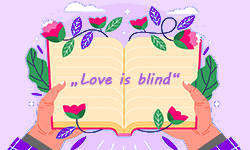
Proverbs are lessons taught by mental images, easy to understand, yet never lacking impact. They describe a piece of advice that many people can relate to or need to be taught about. One of these sayings is “love is blind.” It is probably the most widely known proverb, and everyone who has been in love once will know what is meant by it. The following article will dive into the origin of it and explore the meaning on a deeper level.
Definition: “Love is blind”
The core meaning of the proverb “love is blind” is that people often do not see the faults and flaws in the people they love. It is most commonly used in the context of romantic relationships, but it applies just the same to friends, family, and other people close to you. The proverb wants to draw attention to your rational mind, saying that especially when you love someone very much, you will easily overlook flaws that might end up hurting you in the end.
The following examples will illustrate the underlying meaning of the proverb “love is blind.”
These examples depict different real-life situations where the proverb applies, showing that love can make you willingly or unwillingly overlook and forgive flaws in the people you care about.
It should be noted that “love is blind” does not literally mean that someone goes blind. It is, foremost, a personification of “love” because an emotion itself cannot “see” in the first place.
Explanation of the visual meaning
The visual representation of the proverb “love is blind” symbolizes the idea that when you love someone, whether it is romantically or platonically, you are bound to overlook their flaws. The visual shows us that the heart does not look at people and judge their actions. Instead, it focuses only on what you feel, or rather, how another person makes you feel.

How to use it
The proverb “love is blind” is mostly used in romantic contexts, but it can still apply to any kind of love. Here’s how it applies in different settings.
In personal relationships, the proverb refers to the fact that a person in love will most likely overlook flaws or incompatibilities with their partner.
Family love can, and in most cases will, also be blind. People will forgive family members way more easily than they would with others.
Origin and history
The origin of “love is blind” lies in the 1400s in a text from Geoffrey Chaucer called “The Merchant’s Tale.” Although back then it was not immediately adopted as a proverb, it is still the first documented source.
“For loue is blynd alday and may nat see.”
However, the observation of the fact is much older and described by Plato as:
“For the lover is blind in his view of the object loved…”
William Shakespeare popularized the saying with his works “Henry V,” “Two Gentlemen of Verona,” and “The Merchant of Venice.”
Science
This proverb, “love is blind,” actually holds some truth in it, as a study from London in 2004 shows. The researchers found out that being in love suppresses the activity in other parts of the brain responsible for critical thinking. This means that love actually hinders our rational thinking, making us “blind” to any reasoning of others or ourselves.
Similar proverbs and synonyms
Here is a collection of comparable proverbs and synonyms that emphasize the concept of blindness towards the flaws of someone you care about.
- Beauty is in the eye of the beholder
- The heart wants what it wants
- Love makes fools of us
- Ignorance is bliss
- Love and reason seldom keep company
- Love sees no flaws
- Love is irrational
- Heart over head
- Love’s eyes are closed
FAQs
It means that when you care about a person very much, you are more likely to overlook their faults and flaws. You may also forgive them more easily and care less about their appearance than their character.
In “The Merchant of Venice” by Shakespeare, Jessica says, “Love is blind and lovers cannot see the pretty follies that themselves commit.”
Although it may be considered a metaphor, this proverb is first and foremost a personification. The emotion of “love” is here personified as being blind, although this is a condition that can only happen to animals and humans.
- ✓ Free express delivery
- ✓ Individual embossing
- ✓ Selection of high-quality bindings